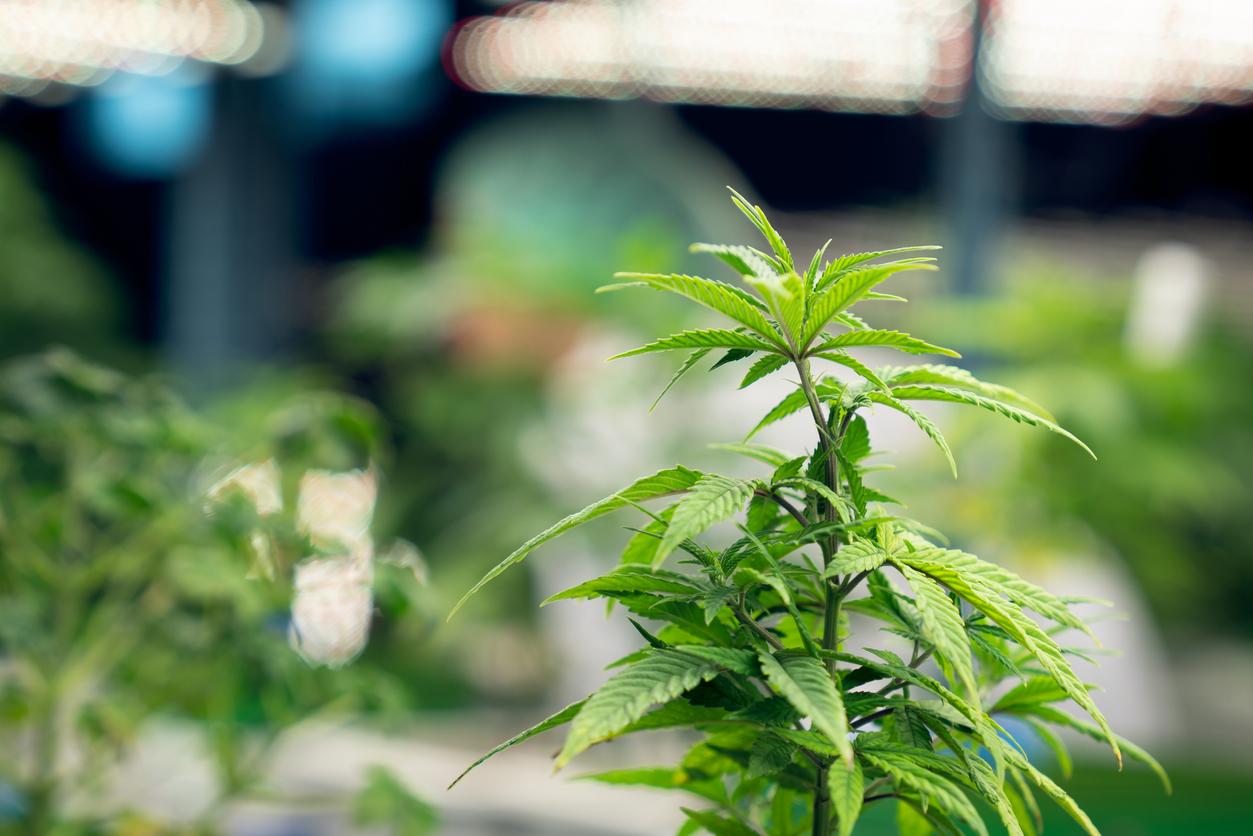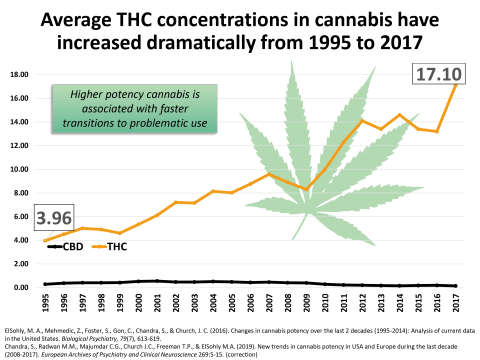
Starting July 1, possessing and using small amounts of cannabis (marijuana) will be legal in Maryland for adults 21 and older.
While lawmakers are still discussing the business and enforcement side of the recreational cannabis market, Science Writer Allison Eatough met with Professor Amelia Arria, director of the Center on Young Adult Health and Development and an expert on the risk of substance use problems among adolescents and young adults, to understand how this change may impact the health of teens and adults. Here are some key takeaways.
Cannabis has become more potent in recent years.
Today’s cannabis is a totally different substance than what was available years ago. The concentration of THC, the psychoactive component in cannabis, has risen dramatically (see Figure below). More potent products have become the norm and are widely available. Cannabis, especially high-potency products, is associated with a variety of problems, including risk for addiction, mental health issues and academic disengagement.
Cannabis can be addictive.
“It is possible to become addicted to cannabis,” Arria said. “Individuals who start early or use regularly have an increased risk of cannabis use disorder - a term health professionals use to describe the problems people experience as a result of using cannabis. The criteria are the same as those for other substance use disorders.”
One major sign of cannabis use disorder (CUD) is continued use despite negative consequences, she added. People with CUD also spend a lot of time preoccupied with getting the drug, using the drug or getting over the effects of the drug.
Cannabis is linked to mental health issues.
“Although people think using cannabis might help improve their mood or relieve anxiety, science tells us that cannabis can worsen or raise the risk for developing a mental health problem,” Arria said. “One of the main developmental tasks of young adulthood from 18 to 25 is learning how to positively cope with stressful life situations. If cannabis use is a go-to strategy, then the person is missing the opportunity to learn and practice healthy coping skills.”
Cannabis use can be a barrier to academic success.
“We’ve shown that over time cannabis use, especially when frequent, is associated with a higher risk of skipping class, performing more poorly in school and delaying graduation,” Arria said. “Cannabis affects your learning and memory, which can make it harder to process information.”
Using any kind of psychoactive substance, including cannabis, provides an immediate, but short-lived, pleasurable sensation. Regular use can reinforce this immediate reward, and other activities and interests can lose their value. As a result, a person may focus more on getting and using the drug.
“Academic pursuits in college are challenging, require sustained focus, but they also carry long-term rewards,” Arria said. “After a while, the immediate gratification from drug use can overtake one's academic motivation, leading to a loss of interest in school and disengagement.”
Cannabis users are more likely to use other illicit drugs.
“About 45% of individuals who use cannabis at some point in their life will progress to using other illicit drugs,” Arria said. “We know that there's a higher proportion of people who use cannabis who progress to other substance use compared to individuals who don't use cannabis.”
The FDA has not approved cannabis to treat any medical disease or condition.
Cannabis-derived and cannabis-related products have been approved for a small number of medical uses. Although products in states that have legalized medical and/or recreational cannabis often list a variety of medicinal or therapeutic uses, they have not been approved by the Food and Drug Administration (FDA).
“I talk to a lot of parents who think cannabis used for medicinal purposes has gone through the FDA approval process like other prescription medicines,” Arria said. “They are surprised to learn they have not. It's important for consumers to realize that the FDA has not required testing of medicinal cannabis products for their safety or therapeutic value.”
The FDA is particularly concerned that consumers might use CBD products in place of approved treatments for medical conditions. Even delaying approved treatment through the use of these products can have dangerous consequences, Arria said.
The FDA has approved one cannabis-derived drug product: Epidiolex (cannabidiol), and three synthetic cannabis-related drug products: Marinol (dronabinol), Syndros (dronabinol), and Cesamet (nabilone). These products are only available with a prescription from a licensed healthcare provider.
Cannabis use is an increasing concern for college campuses.
“About 2.6 million people started using cannabis in the U.S. in 2021,” Arria said. “And of that total, about 60% were younger than 21 years old. Higher education professionals are looking for guidance on addressing the challenges surrounding cannabis use.”
Students of any age cannot use cannabis on university campuses or during campus activities now or after July 1.
“The Drug-Free Schools and Communities Act requires all colleges and universities receiving federal funds to adopt and implement programs that include standards of conduct that clearly prohibit, at a minimum, the unlawful possession, use or distribution of illicit drugs and alcohol by students and employees on its property or as part of any of its activities,” Arria said.
It will still be illegal to smoke cannabis in public in Maryland.
“Under the new law, it will still be illegal to smoke cannabis in public,” Arria said. “That includes any place where the public has access like streets, bars, shops, public parks and theaters.”
Learn more about the University of Maryland’s alcohol and drug policies and resources.
